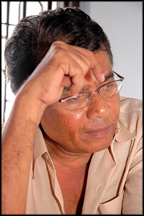Instilling life to theatre
Aravinda HETTIARACHCHI
Theatre was the first and foremost aesthetic medium of his
generation. Those days, cinema was just a medium of diversion to him and
to his contemporaries. Yet theatre became the most intimate and
educative medium to them. As a school going student, he did not have an
opportunity to learn practical drama and theatre in school. In his
school, Sakunthala was the only play he knew in his syllabus. Yet 'Sakunthla'
was not a drama script that is ever performed in our stage.
 |
|
Darmasiri
Bandaranake |
In 1960's, frank theatre artist Darmasiri Bandaranake entered to this
universe of theatre through good literature and the stage plays of that
time. This was the only entrée to then practical theatre in this
country. Thus, he himself found the real teachers formed of the theatre
outside the orthodox educational system. They were the then local
dramatists.
The examination papers of that time have never had any relevance to
this particular local theatre. Therefore, this formal education and the
theatre he admired became very different segments to his own life. And
the practical theatre was always developed outside the conventional
institution system. Thus, in those days, theatre became another
unofficial educational association to him.
Through this unofficial connection, he got a chance to be familiar
with the internationally and locally well recognized world dramatists.
Thus, he was stimulated to experience theatre as a medium of his own
life.
It was the medium of his own generation. This is why he admired
theatre. Consequently, even today, whenever he visits a foreign country,
he is always eager to enter a theatre. For him and his generation, the
theatre is still a wonderful place to be with.
Therefore, whenever he had a chance to act in a play, he voluntarily
attached to the opinions of the play director and never removed his soul
from the particular character even after his performance. After the
performance, he could never depart as an alien. He always departed the
theatre as different new being of life.
He experienced the outside society with the same qualities of the
characters he performed in theatre and was never alienated from the
dramatic context in his real life. Thus all the struggles and
demonstrations in his common life, one-way or another, were inspired by
then theatre experiences.
Darmasiri Bandaranayake had experienced the play Hunuwataye Kathawa
in the 1960s. He was in true love with the character of Groucha of
Hunuwataye Kathawa than the princes 'Maname'of 'Maname'.
To him, Groucha signifies his own generation. He has struggled for
the rights in theatre and in society. Groucha's character was one of the
metaphoric influences that lead his way in theatre and common life. His
particular affection to the theatre fabricated clearly within a
political context. After 1970's, a new political horizon unwrapped from
the theatre in Sri Lanka.
In 1971, Sugathapala de Silva brought Dunna Dunugamuwe, a stage play
with a huge political significance. Yet Sugathapala's Hitha Honda
Ammandi was a more political one than that. On the other hand, Henri
Jayasena had staged Manaranjana Wadawarjene which was also a political
context of a play. Thus, there was a sequence of plays of this kind of
political plots. He learned from these plays.
He has read their faults in practical theatre and in politics. Yet
these plays had constructed a huge social discourse in the society and
in Darmasiri as well.
This discourse opened a new page in Sri Lankan theatre of politics.
Darmasiri was working in the government clerical staff while the play
Dunna Dunugamuwe appeared on stage. He embraced this drama for the
reason that his life and the lives related to him were embodied in it.
Betrayal of struggles, blotting out of the working movements was very
common factors on those days. These facts have thoroughly discussed
within this play. In addition, the glamor of the audience of those days
was huge.
Daramasiri and his generation, in those days of society, have found
no risk of engaging in this field of drama even though it has developed
outside the state institutions (the state capital).
All the theatre artists prior to his generation such as Dayananda
Gunawardane, Henri Jayasena, Sugathapala de Silva, Dhamma Jagoda etc
were very much engaged in theatre from 1960s to 1970s. For instance,
after the 1971 insurgency, Dhamma Jagoda has produced a play called
Malavun Nagiteema.
Moreover, the discourse of this play was very much familiar to then
social background of then country. On the other hand, state censorship
was a common factor in then theatre.
Weeramuni was planning to introduce the French Jean Paul Sartre's
'Men without Shadows' to the Sri Lankan theatre. Yet then government
censored this play script and Namel has never tried this production in
stage thereafter.
Thus, they have censored several plays such as 'Apata Puthe Mgak
Nathe', Rankada, Ranthodu and so on. Yet development of the theatre
outside the state institutional system was not in a crucial risk at that
time such as today even though there were several landmarks of state
censorship. The spectator of those days was the vital reason for this.
Yet Darmasiri's generation recognized the foundation of this
particular risk of non-institutionalized theatre at the edge of 1980's.
He himself has staged 'Dhawala Bheeshana' (a translation of Sartre's
'Men without Shadows') in 1988.
He had experienced the same dramatic context of this play in the real
society just one year after in 1989. He had death threats from both
side, the revolutionaries and the system that has persecuted the
revolutionaries. He had to stop all his stage shows and migrate to
another country. His spectators were the people who protected him.
Then only he found that doing creative art outside the state
institutional system as a risk even beyond the limits of life and of
death.
|



